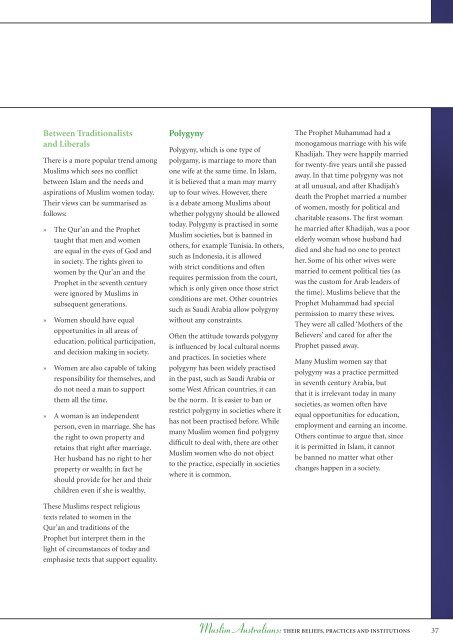Muslim Australians - Religion Cultural Diversity Resource Manual
http://www.islamicglobe.com
http://www.islamicglobe.com
You also want an ePaper? Increase the reach of your titles
YUMPU automatically turns print PDFs into web optimized ePapers that Google loves.
Between Traditionalists<br />
and Liberals<br />
There is a more popular trend among<br />
<strong>Muslim</strong>s which sees no conflict<br />
between Islam and the needs and<br />
aspirations of <strong>Muslim</strong> women today.<br />
Their views can be summarised as<br />
follows:<br />
» The Qur’an and the Prophet<br />
taught that men and women<br />
are equal in the eyes of God and<br />
in society. The rights given to<br />
women by the Qur’an and the<br />
Prophet in the seventh century<br />
were ignored by <strong>Muslim</strong>s in<br />
subsequent generations.<br />
» Women should have equal<br />
opportunities in all areas of<br />
education, political participation,<br />
and decision making in society.<br />
» Women are also capable of taking<br />
responsibility for themselves, and<br />
do not need a man to support<br />
them all the time.<br />
» A woman is an independent<br />
person, even in marriage. She has<br />
the right to own property and<br />
retains that right after marriage.<br />
Her husband has no right to her<br />
property or wealth; in fact he<br />
should provide for her and their<br />
children even if she is wealthy.<br />
These <strong>Muslim</strong>s respect religious<br />
texts related to women in the<br />
Qur’an and traditions of the<br />
Prophet but interpret them in the<br />
light of circumstances of today and<br />
emphasise texts that support equality.<br />
Polygyny<br />
Polygyny, which is one type of<br />
polygamy, is marriage to more than<br />
one wife at the same time. In Islam,<br />
it is believed that a man may marry<br />
up to four wives. However, there<br />
is a debate among <strong>Muslim</strong>s about<br />
whether polygyny should be allowed<br />
today. Polygyny is practised in some<br />
<strong>Muslim</strong> societies, but is banned in<br />
others, for example Tunisia. In others,<br />
such as Indonesia, it is allowed<br />
with strict conditions and often<br />
requires permission from the court,<br />
which is only given once those strict<br />
conditions are met. Other countries<br />
such as Saudi Arabia allow polygyny<br />
without any constraints.<br />
Often the attitude towards polygyny<br />
is influenced by local cultural norms<br />
and practices. In societies where<br />
polygyny has been widely practised<br />
in the past, such as Saudi Arabia or<br />
some West African countries, it can<br />
be the norm. It is easier to ban or<br />
restrict polygyny in societies where it<br />
has not been practised before. While<br />
many <strong>Muslim</strong> women find polygyny<br />
difficult to deal with, there are other<br />
<strong>Muslim</strong> women who do not object<br />
to the practice, especially in societies<br />
where it is common.<br />
The Prophet Muhammad had a<br />
monogamous marriage with his wife<br />
Khadijah. They were happily married<br />
for twenty-five years until she passed<br />
away. In that time polygyny was not<br />
at all unusual, and after Khadijah’s<br />
death the Prophet married a number<br />
of women, mostly for political and<br />
charitable reasons. The first woman<br />
he married after Khadijah, was a poor<br />
elderly woman whose husband had<br />
died and she had no one to protect<br />
her. Some of his other wives were<br />
married to cement political ties (as<br />
was the custom for Arab leaders of<br />
the time). <strong>Muslim</strong>s believe that the<br />
Prophet Muhammad had special<br />
permission to marry these wives.<br />
They were all called ‘Mothers of the<br />
Believers’ and cared for after the<br />
Prophet passed away.<br />
Many <strong>Muslim</strong> women say that<br />
polygyny was a practice permitted<br />
in seventh century Arabia, but<br />
that it is irrelevant today in many<br />
societies, as women often have<br />
equal opportunities for education,<br />
employment and earning an income.<br />
Others continue to argue that, since<br />
it is permitted in Islam, it cannot<br />
be banned no matter what other<br />
changes happen in a society.<br />
<strong>Muslim</strong> <strong>Australians</strong>:THEIR BELIEFS, PRACTICES AND INSTITUTIONS 37














